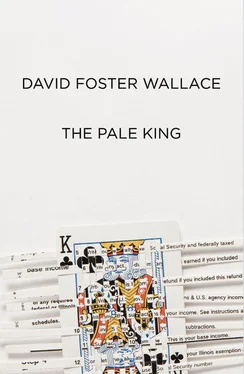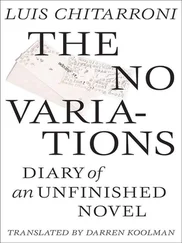‘Wasn’t it the Thirteenth Amendment that blacks and corporations exploited?’
‘Let me throw him off, Mr. G., I’m pleading with you.’
‘Here’s something worth throwing out there. It was in the 1830s and ’40s that states started granting charters of incorporation to larger and regulated companies. And it was 1840 or ’41 that de Tocqueville published his book about Americans, and he says somewhere that one thing about democracies and their individualism is that they by their very nature corrode the citizen’s sense of true community, of having real true fellow citizens whose interests and concerns were the same as his. This is a kind of ghastly irony, if you think about it, since a form of government engineered to produce equality makes its citizens so individualistic and self-absorbed they end up as solipsists, navel-gazers.’
‘De Tocqueville is also talking about capitalism and markets, which pretty much go hand in hand with democracy.’
‘I just don’t think this is what I was trying to talk about. It’s easy to blame corporations. DeWitt’s saying if you think the corporations are evil and it’s the government’s job to make them moral, you’re deflecting your own responsibility to civics. You’re making the government your big brother and the corporation the evil bully your big brother’s supposed to keep off you at recess.’
‘De Tocqueville’s thrust is that it’s in the democratic citizen’s nature to be like a leaf that doesn’t believe in the tree it’s part of.’
‘What’s interesting in a depressing way is that tacit hypocrisy — I, the citizen, will keep buying big gas-guzzlers that kill trees and tickets for The Exorcist until the government passes a law, but then when the government does pass a law I’ll bitch about Big Brother and getting the government off our back.’
‘See for instance the cheat-rate and the appeals percentage after audit.’
‘It’s more like I want a law to keep you from gas-guzzling and seeing The Wild Bunch, but not me.’
‘Not in my backyard is the hue and cry.’
‘Lady gets stabbed over off the river, houses up and down the block hear her screaming, nobody even sets foot outside.’
‘Not get involved.’
‘Something’s happened to people.’
‘People saying those damned tobacco companies while they smoke.’
‘It’s not fair to put down any critique of the corporate role in this kind of civic decline as just a simple knee-jerk demonization of corporations, though. The corporate agenda of maximizing profit by creating demand and trying to make demand inelastic can play a catalyst role in this syndrome Mr. Glendenning’s trying to limn without being the devil or bent on world domination or something.’
‘I believe Nichols has another two cents here.’
‘I think he’s trying to say something.’
‘Because I think it goes beyond politics, civics.’
‘I’m listening at least, Stuart.’
‘Not even on a tree but more like leaves on the ground in the wind, blown this way and that way by the wind, and each time a gust blows it the citizen says, “Now I choose to blow this way; this is my decision.”’
‘With the wind being Nichols’s corporate menace.’
‘It’s almost more a matter of metaphysics.’
‘Yee ha.’
‘Hoo doggy.’
‘Say what we’re in now is some transition in the economy and society between the age of industrial democracy and the stage that comes after, where what industrial democracy was about was production and the economy depended on constantly increasing production and the democracy’s big tension was between industry’s needs for policies that abetted production and citizens’ needs to both benefit from all the production and still have their basic rights and interests protected from industry’s simpleminded emphasis on production and profits.’
‘I’m not sure where the metaphysics comes in here, Nichols.’
‘Maybe it’s not metaphysics. Maybe it’s existential. I’m talking about the individual US citizen’s deep fear, the same basic fear that you and I have and that everybody has except nobody ever talks about it except existentialists in convoluted French prose. Or Pascal. Our smallness, our insignificance and mortality, yours and mine, the thing that we all spend all our time not thinking about directly, that we are tiny and at the mercy of large forces and that time is always passing and that every day we’ve lost one more day that will never come back and our childhoods are over and our adolescence and the vigor of youth and soon our adulthood, that everything we see around us all the time is decaying and passing, it’s all passing away, and so are we, so am I, and given how fast the first forty-two years have shot by it’s not going to be long before I too pass away, whoever imagined that there was a more truthful way to put it than “die,” “pass away,” the very sound of it makes me feel the way I feel at dusk on a wintry Sunday—’
‘Anybody got the time? How long we been in here, three hours?’
‘And not only that, but everybody who knows me or even knows I exist will die, and then everybody who knows those people and might even conceivably have even heard of me will die, and so on, and the gravestones and monuments we spend money to have put in to make sure we’re remembered, these’ll last what — a hundred years? two hundred? — and they’ll crumble, and the grass and insects my decomposition will go to feed will die, and their offspring, or if I’m cremated the trees that are nourished by my windblown ash will die or get cut down and decay, and my urn will decay, and before maybe three or four generations it will be like I never existed, not only will I have passed away but it will be like I was never here, and people in 2104 or whatever will no more think of Stuart A. Nichols Jr. than you or I think of John T. Smith, 1790 to 1864, of Livingston, Virginia, or some such. That everything is on fire, slow fire, and we’re all less than a million breaths away from an oblivion more total than we can even bring ourselves to even try to imagine, in fact, probably that’s why the manic US obsession with production, produce, produce, impact the world, contribute, shape things, to help distract us from how little and totally insignificant and temporary we are.’
‘This is supposed to be news to us. News flash: We’re going to die.’
‘Why do you think people buy insurance?’
‘Let him finish.’
‘Now this is depressing instead of just boring.’
‘The post-production capitalist has something to do with the death of civics. But so does fear of smallness and death and everything being on fire.’
‘I smell Rousseau at the root here, the same way you were talking about de Tocqueville before.’
‘As usual DeWitt’s way ahead of me. It probably does start with Rousseau and the Magna Carta and the French Revolution. This emphasis on man as the individual and on the rights and entitlements of the individual instead of the responsibilities of the individual. But corporations and marketing and PR and the creation of desire and need to feed all the manic production, the way modern advertising and marketing seduce the individual by flattering all the little psychic delusions with which we deflect the horror of personal smallness and transience, enabling the delusion that the individual is the center of the universe, the most important thing — I mean the individual individual, the little guy watching TV or listening to the radio or leafing through a shiny magazine or looking at a billboard or any of the million different daily ways this guy comes into contact with Burson-Marsteller’s or Saachi & Saachi’s big lie, that he is the tree, that his first responsibility is to his own happiness, that everyone else is the great gray abstract mass which his life depends on standing apart from, being an individual, being happy. ’
Читать дальше












